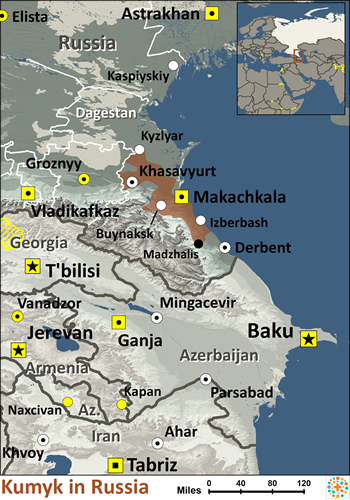The Kumyk are a Muslim, agricultural people located along the northwestern coast of the Caspian Sea inside Dagestan in southern Russia. The Kumyk people make their livelihood primarily by farming, vineyards, and raising cattle. Although the modern era has led a few Kumyk to settle in other regions of the North Caucasus, as a whole they've chosen to live close to their ancestral home on the upper terraces of the Kumyk Plateau in Dagestan. The reason is most likely due to the fertile soil that this pleasant plateau has always offered their people. The Kumyk are one of two Turkic-language peoples among the 34 languages of Dagestan (the Nogai the other Dagestani Turkic language).
The Kumyks became Muslims in the 9th century. The hearts of the Kumyk have not been fertile to the gospel of Jesus since the 9th century. Few cultural remnants of Christianity remain. Starting from the 16th-19th Centuries under the Shamkhal Khanate the Kumyk exerted major political leadership in the region of central Dagestan. The Russian language started replacing Kumyk as the lingua franca in the Caucasus region in the 19th century. Russian is the language that people of the Caucasus speak to a person outside their group.
A religious, cultural mix of traditions is evident in Kumyk art, dance, marriage ceremonies, and folk music. Family and village elders instruct youth in the ways of their people. The Kumyk are historically a proud people, respected in Dagestan for their literary, artistic, and economic accomplishments.
The Kumyk marry within their group. They tend to have large families as children, especially boys, are seen as blessings from Allah. Families arrange marriages with the consent of the young people. Most Kumyk still live in rural villages. The Kumyk people make their livelihood primarily by farming, vineyards, and raising cattle. Some young people are moving to cites in search of a better life. Some have taken advantage of the free educational system and become professionals.
At present there are believed to be as many less than 100 Kumyk followers of Jesus. In 2007 the New Testament was published in the Kumyk language, and now Genesis, Psalms and Proverbs have also been completed in Kumyk. Kumyk believers risk rejection by their families, as well as a threat to their livelihood, if their identity in Christ becomes known in the midst of the intensely Muslim Kumyk society of Dagestan. For this reason, the church does not exist publicly amongst the Kumyk.
They worshiped Tengiri and various spirits and demons. Islam is an overlay to these beliefs which remain today
The vast majority of the Kumyk practice Sunni Islam. Their brand of Islam is mixed with folk religion. Islam is viewed as part of a Kumyk's identity.
The Kumyk must see that Christianity is not exclusively a Russian or European religion. Christ alone can forgive their sins and grant them eternal life. The Kumyk must understand that becoming a follower of Christ will not affect the identity as Kumyk.
Pray that the few Kumyk believers would be strong in the faith and share the gospel with their family and neighbors.
Ask the Lord to send workers to the Kumyk of Russia.
Pray for an openness to hearing the claims of Christ among the Kumyk elders and leaders.
Ask the Lord to raise up a thriving Kumyk church in this decade.
Scripture Prayers for the Kumyk in Russia.
| Profile Source: Joshua Project |
| Other PDF Profile |

























